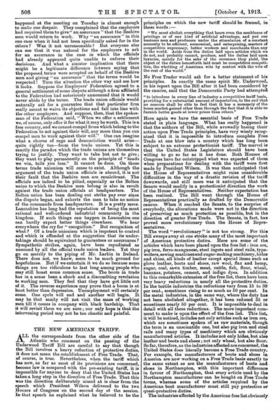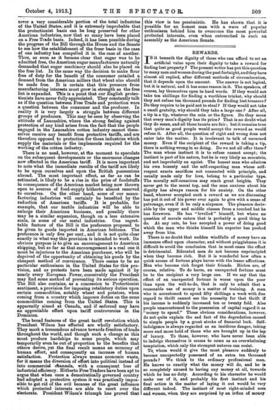THE NEW AMERICAN TARIFF.
ALL the correspondents from the other side of the Atlantic who comment on the passing of the Underwood Tariff Bill are careful to say that though the Bill involves a heavy reduction of protective duties, it does not mean the establishment of Free Trade. That, of course, is true. Nevertheless, when the tariff which has now, so far as most of its provisions are concerned, become law is compared with the pre-existing tariff, it is impossible for anyone to deny that the United States has taken a long step in the direction of Free Trade. That this was the direction deliberately aimed at is clear from the speech which President Wilson delivered to the two Houses of Congress on the second day of the session. In that speech he explained what he believed to be the principles on which the new tariff should be framed, in these words :— " We must abolish everything that bears even the semblance of privilege or of any kind of artificial advantage, and put our business men and producers under the stimulation of a constant necessity to be efficient, economical, and enterprising, masters of competitive supremacy, better workers and merchants than any in the world. Aside from the duties laid upon articles which we do not, and probably cannot, produce, and the duties laid upon luxuries, merely for the sake of the revenues they yield, the object of the duties henceforth laid must be competitive competi- tion, the whetting of American wits by contest with the wits of the rest of the world."
No Free Trader would ask for a better statement of his principles. In exactly the same spirit Mr. Underwood, in his report upon the Bill after it had been considered by the caucus, said that the Democratic Party had attempted "to introduce in every line of industry a competitive tariff basis, providing for a substantial amount of importation, to the end that no concern shall be able to feel that it has a monopoly of the home market gained other than through the fact that it is able to furnish better goods at lower prices than others."
Here again we have the essential basis of Free Trade stated in plain language. What has really happened is that the authors of the Bill, while avowedly basing their action upon Free Trade principles, have very wisely recog- nized that it is impossible to introduce complete Free Trade at one blow into a country which has long been subject to an extreme protectionist tariff. The marvel is that the United States Legislature should have been willing to go so far as it has done. Both Houses of Congress have far outstripped what was expected of them when preparations for dealing with the tariff were first made by President Wilson. It was then anticipated that the House of Representatives might raise considerable difficulties in the way of a drastic revision of the tariff downwards, and still more was it anticipated that the Senate would modify in a protectionist direction the work of the House of Representatives. Neither expectation has- been realized. The Bill went through the House of Representatives practically as drafted by the Democratic caucus. When it reached the Senate, to the surprise of everybody, the alterations made were not in the direction of preserving as much protection as possible, but in the direction of greater Free Trade. The Senate, in fact, has proved more revolutionary than the House of Repre- sentatives.
The word " revolutionary " is not too strong. For this Bill sweeps away at one stroke many of the most important of American protective duties. Here are some of the articles which have been placed upon the free list : iron ore, pig iron, ferro-manganese, steel ingots and steel rails, type- writers, sewing machinesand sugar-making machinery, hides and skins, all kinds of leather except special items such as glove leather, boots and shoes, raw wool, flax and hemp, sugar, coal, sawn timber, meat, cattle, fish, flour, wheat, bananas, potatoes, cement, and indigo dyes. In addition to this remarkable extension of the free list, there have been very heavy reductions in nearly all the protective duties. In the textile industries the reductions vary from 15 to 30 per cent., sometimes rising to as much as 50 per cent. In the metal industries, in the same way, where the duty has not been abolished altogether, it has been reduced 35 or sometimes nearly 50 per cent. It is impossible to deal in detail with all these reductions. The more important com- ment to make is upon the effect of the free list. This list, it will be noticed, includes not only articles such as iron ore, which are sometimes spoken of as raw materials, though the term is an unscientific one, but also pig iron and steel rails and many types of machinery which are obviously manufactured articles. It includes not only hides, but also leather and boots and shoes ; not only wheat, but also flour. So far, therefore, as the industries affected are concerned, the United States does literally become a Free Trade country. For example, the manufacturers of boots and shoes in America are now working on a Free Trade basis exactly to the same extent as are the manufacturers of boots and shoes in Northampton, with this important difference in favour of Northampton, that every article used by the Northampton manufacturer can be bought on Free Trade terms, whereas some of the articles required by the American boot manufacturer must still pay protective or quasi-protective duties.
The industries affected by the American free list obviously cover a very considerable portion of the total industries of the United States, and it is extremely improbable that the protectionist basis can be long preserved for other American industries, now that so many have been placed on a Free Trade basis. Indeed, it has been possible during the progress of the Bill through the House and the Senate to see how the establishment of the freer basis in the case of one industry has compelled it in the case of another. Thus, as soon as it became clear that sugar was to be admitted free, the American sugar manufacturers naturally demanded that sugar machinery should also be placed on the free list. In the same way the decision to make flour free of duty for the benefit of the consumer entailed a demand from the American millers that wheat also should be made free. It is certain that this pressure from manufacturing interests must grow in strength as the free list is expanded. This is a point that our English protec- tionists have never fully appreciated. They constantly talk as if the question between Free Trade and protection were a question between the consumer and the producer. In reality it is very largely a struggle between different groups of producers. This may be seen by observing the attitude of Lancashire, where the strong feeling against protection of any kind arises from the fact that the people engaged in the Lancashire cotton industry cannot them- selves receive any benefit from protective tariffs, and are therefore opposed to protection for those industries which supply the materials or the implements required for the working of the cotton industry.
There is no need, however, at the moment to speculate on the subsequent developments or the enormous changes now effected in the American tariff. It is more important to note what the immediate results of the tariff are likely to be upon ourselves and upon the British possessions abroad. The most important effect, as far as can be estimated, is likely to be a rise in the price of foodstuffs in consequence of the American market being now thrown open to sources of food-supply hitherto almost reserved to ourselves. On the other hand, some of our manu- facturing industries will certainly be benefited by the reduction of American tariffs. It is probable, for example, that our textile industries will be able to enlarge their American business, and possibly there may be a similar expansion, though on a less extensive scale, in some of our metal industries. One regret- table feature of the Bill is the preference proposed to be given to goods imported in American bottoms. The preference is only five per cent., and it is not quite clear exactly in what way this provision is intended to work. Its obvious purpose is to give an encouragement to American shipping, but so far as that encouragement is a real one it must be injurious to the American purchaser, who will be deprived of the opportunity of obtaining his goods by the cheapest method of conveyance. There seems to be no particular enthusiasm in the United States for this pro- vision, and as protests have been made against it by nearly every European Power, conceivably the President may find some method of preventing its serious operation. The Bill also contains, as a concession to Protectionist sentiment, a provision for imposing retaliatory duties upon certain commodities, notably wheat and potatoes, when coining from a country which imposes duties on the same commodities coming from the United States. This is apparently aimed at Canada, and if enforced may have an appreciable effect upon tariff controversies in the Dominion.
The broad features of the great tariff revolution which President Wilson has effected are wholly satisfactory. They mark a tremendous advance towards freedom of trade throughout the world, and though such a change as this must produce hardships to some people, which may temporarily even be out of proportion to the benefits that others derive, yet the final result means an economy of human effort, and consequently an increase of human satisfaction. Protection always means economic waste, for it means the diversion of effort into political instead of into commercial channels, with a consequent loss of industrial efficiency. Hitherto Free Traders have been apt to argue that when once a demodratically governed country had adopted a protective system it was practically impos- sible to get rid of the evil because of the great influence which protected interests are able to exert over the electorate. President Wilson's triumph has proved that this view is too pessimistic. He has shown that it is possible for an honest man with a wave of popular enthusiasm behind him to overcome the most powerful protected interests, even when entrenched in such an assembly as the American Senate.



































































 Previous page
Previous page